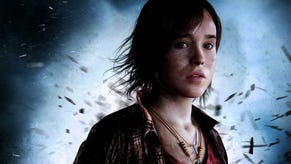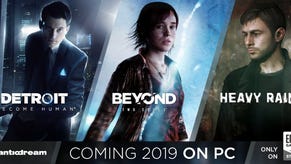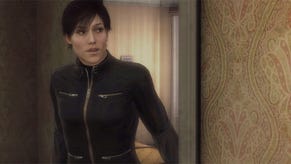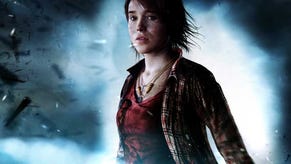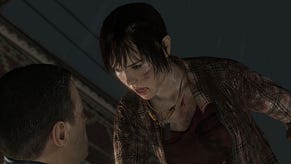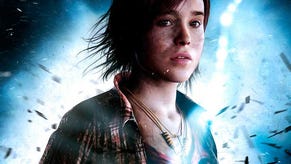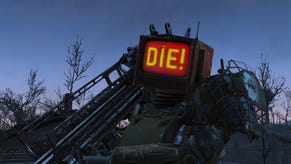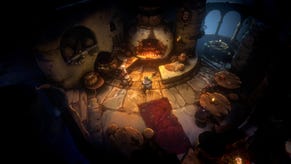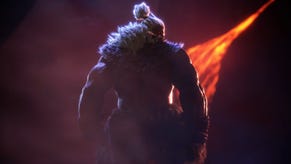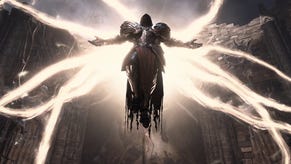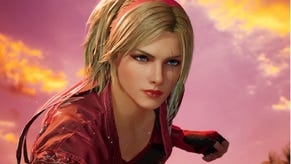"We didn't try to replicate Heavy Rain": Cage on writing Beyond
Beyond: Two Souls writer and director David Cage tells VG247's Dave Cook how he approached the game's script, and how diverse writing can change the way we perceive gaming at large.
Writing in games has improved drastically over the past few decades. From the chest-beating swagger of blockbuster action epics to the subtle, often mute indie darlings, there's a broad spectrum of penmanship out there today. Consider the weight of Mass Effect 3's narrative, then compare it to something like Amnesia: The Dark Descent. Both titles are capable of getting under your skin, but they do so in drastically different ways. Such is the power of diverse writing.
What is Beyond in this regard? Is it to be compared to the Hollywood money-spinner, or is it comparable to an avant-garde feature geared towards the enthusiast? Does its action sequences cut too deeply into moments of pathos, or does David Cage's love of emotion reduce the anguish felt by Jodie Holmes to parody?
I stopped to consider these questions before interviewing Cage at Eurogamer Expo last week. These are issues he has likely encountered throughout Beyond's creation as both script-writer and director. We're in polarising times indeed, with the age of blockbusters churning out sequels and bombast every month. Yet - thanks to insane budgets - they're a thinning breed, as the middle ground continues to swell with new, exciting indies and studios willing to take risks. Both sides make compelling arguments about the state of game writing today.
It's tricky to see where Beyond lies in this equation and who, exactly, it speaks to. I asked Cage for his input on these issues after a hands-on with the game's demo, which is out today on PSN.
VG247: I played the Beyond demo earlier and I started to wonder how you form a scene while writing your scripts. Does gameplay dictate your narrative, or does the narrative dictate gameplay?
David Cage: What I try to achieve in every single scene was to have the gameplay supporting the narrative, and the narrative supporting the gameplay. What is even more challenging is that Beyond doesn't rely exactly on mechanics in that you won't always be doing pretty much the same things in those scenes. Each scene is different, each scene is unique so each scene has its own problem you have to solve.
The way I work is thinking about gameplay and story at the same time, but even the basic concept of Beyond is based on this idea. I thought it would be cool to have this girl with an entity, and that part was very interesting from that point of view because you wanted to know what the nature is of this entity, and its relationship. At the same time it contains an interesting proposal for gameplay because you can switch between the girl and the entity. So the basic concept is, you have the story and the gameplay.
VG247: Are there always multiple ways to solve the game's problems? The street stand-off reminded me of the shop scenes like Heavy Rain? Is the plot malleable depending on what you do in these scenes?
David Cage: We didn't try to replicate Heavy Rain, because we would have just done Heavy Rain 2. We really wanted to create an experience that would be different. We wanted to build on what we learned from Heavy Rain: interactive story-telling, the bending story with actions, consequences, emotions, different feelings. All of this is there in Beyond, but Beyond is an emotional journey through the life of someone based over 15 years, where Heavy Rain took place over four days. So it's a different experience.
”For a year I’m writing 12-15 hours a day non-stop. It’s really thinking about the story night and day, literally. It really makes you feel a little bit weird because you don’t socialise any more, you’re always in your mind asking questions and thinking about that, waking up in the middle of the night to go back and write.”
In Beyond there are many ways of playing the game and many parts that you will see or miss depending on how you play. Some actions have local consequences, some consequence are unseen, and others are long-term. But it's a different balance compared to Heavy Rain, so I hope people who play Heavy Rain approach Beyond with a fresh mind, an open-mind, just go on the journey and see what happens.
VG247: You wrote the whole thing. Do you feel your writing has improved since Heavy Rain?
David Cage: It's always a learning curve. It's a learning curve since I started 16 years ago. There was a story in Omikron that no one could really say what the story was about, because it was probably too confusing and not done very well at all. Fahrenheit saw great performance. Heavy Rain was hopefully stronger as well, and I think that Beyond is … the way I see it, is maturity for me as a writer. It's probably the most accomplished thing I've written to date, and it's been a very interesting process.
Also, telling the life of someone was something new to me, and something pretty challenging, because it's about telling compelling things about a little girl who matures to an adult, and when you mix all the scenes – because the game is not told in order – the challenge is to still make sense. These were very, very interesting challenges for me as a writer.
But I would even say that the writing of Beyond was a journey for me. Sometimes you start with an idea, and for me it's always a very simple idea. Then I start writing, and the writing sometimes takes me somewhere else. Then after a year, I realised what I really wanted to talk about, so it's like your little 'inner voice' in a way, took the pen at some point and said what you liked to say. It's a journey for me as a writer.
VG247: Do you dabble in other writing projects as well? Short stories and the like?
David Cage: I would love to but it's a full-time job, and a game like Beyond is insane, and I don't really think gamers realise what it means to the people who made it. For me it's a year in writing, so for a year I'm writing 12-15 hours a day non-stop. It's really thinking about the story night and day, literally. It really makes you feel a little bit weird because you don't socialise any more, you're always in your mind asking questions and thinking about that, waking up in the middle of the night to go back and write. It's challenging.
But then there's a year in shooting, where you stress because it's a year of shooting every day pretty much. It's stressful because of the amount of actors involved in shooting Beyond, and then working every day with people like Ellen Page and Willem Dafoe is a tight pressure, but part of the job. Then you have a year where my job is mainly the filming, building, directing, talking with music composers to make sure everything flows in the right direction. So it's a full time job [laughs].
VG247: Given all of that effort, how does it feel to be the last big first-party release on PS3?
David Cage: We had this discuss with Sony at some point about should we release this game on PlayStation 4, or should we release it on PlayStation 3, and our position has always been that we want to be on PlayStation 3, because we think it's a very exciting moment for the console as it has the bigger install base.
”With the presence of Ellen Page and Willem Dafoe in the game, we managed to open some of these doors, where people who would never talk about video games before are now getting interested. With Beyond it’s about opening that door and to show people that all games are not the same, they are not all about shooting
It'll be years before PlayStation 4 has that audience. In this type of experience, we want as wide a market as possible because you want to talk to the mass market, and not necessarily the early adopters of the new console. We also did the same thing with Fahrenheit on PlayStation 2, and we thought it was the right decision.
VG247: And now you've used PlayStation 4 tech on Kara and The Dark Sorcerer, which I thought was hilarious when you showed it at E3.
David Cage: It was very funny because I was in the audience at E3 and everybody was deadly serious during the first part, and it was really funny to see this moment where the sorcerer goes, “S**t!” [laughs]. Because suddenly everything changes. It almost hit the audience like, 'Oh okay, it's not serious.'
VG247: Is humour something you'd like to explore next? Is that the next big challenge for you?
David Cage: You know, when were thinking about that new technical prototype everybody expected another “Kara”, with a girl who makes you cry and I thought, 'Why not do something people don't expect? What are the other emotions that we have not tried yet?' I realised, we've not done a lot of humour, and actually I had serious doubts about that Sony conference about whether I could write something that was actually funny.
The goal was not to make people laugh, it was to just make you smile and it seemed to have worked. I think it shows that games can create any type of emotion – dramatic or not dramatic – because they've matured and are capable of exploring the other emotions. This is what we wanted to show with The Dark Sorcerer demo.
VG247: It was neat because it pulled people in one direction and then shoved them another. What's your take on game-writing in that regard?
David Cage: It's a very interesting situation right now. I think with the games we make, we're in a more interesting position. We get these preconceptions certainly from hardcore gamers who say, 'Oh it's not a videogame. It's interactive cinema and we're not interested in games where you don't shoot.' So they're not interested in our games. But at the other end of the spectrum we see people who are like, 'We see what you're doing, delivering emotion, but videogames are still all about violence and shooting.'
So what I think we're doing is trying to say to both ends, 'Wait a second. Look at what we're doing and then make your judgement.' But we like to say to hardcore gamers, 'Yes there are some great games out there whether it's GTA, Call of Duty and all of those things, but look, this is something a little bit different.' It's not about shooting. It's different but give it a try. For the sake of society have a look, because all games are not about violence. They are about very different things.
There are very interesting indie games right now exploring very different reactions that are clearly not about violence, that are trying to make this medium really strong. There is definitely something happening in the industry just now and we should look at this. It's interesting because with the presence of Ellen Page and Willem Dafoe in the game, we managed to open some of these doors, where people who would never talk about video games before are now getting interested. With Beyond it's about opening that door and to show people that all games are not the same, they are not all about shooting.
VG247: When I last interviewed you at gamescom in 2012, I asked if you could ever see a world where actors in digital games are awarded in the same way the Academy awards film performances. Shortly after that, Kara actor Valorie Curry actually won an award for her role. What does that say to you?
David Cage: It's difficult to answer this question because I personally feel that the performance delivered by Valorie Curry in Kara deserved an award for acting. She's a fantastic actor and she's actually in a very successful TV series right now. She's just a great actress. The same thing for Ellen Page in Beyond. I look at her performance and I think what she's done is amazing. I've never seen a video game character doing what she does. I think she's just amazing. Does she deserve an award? Yeah probably, I'd say so.
But at the same time when you think about development, not everybody is interested in acting, and others think it's something that should play a role in the games industry. So there are different points of view. We'll see how it goes. Since Heavy Rain some games have tried to deal with acting and emotion, and that's very good. We'll see if it's a growing trend or just an erratic trend in the industry.
VG247: Where do you see those trends going in years to come?
David Cage: At Quantic Dream or in general?
VG247: In general.
David Cage: I really don't know what to expect in the future of the games industry, but for me, from where it is today can go in very different directions. What I see today is big triple-a titles with crazy budgets, incredible teams working on one game, but maybe not that creative because there's so much money involved they don't want to take any creative risks. So we keep getting pretty much the same thing year after year just to keep their fan base.
On the other side I'd say the indie space is very interesting, with very small developers of about four or five guys, and they are trying to find new creative new ideas. That is very interesting. At Quantic Dream we share that view. We believe that we are really an independent developer because we have full creative freedom, we can do whatever we want. We don't follow necessarily the rules of marketing, we don't make sequels, we do things that present a lot of risk.
But at the same time we have the support of a major console manufacturer that give us all the resources. If you asked me where I would like the future to be, then I would say indie developers. I hope they will really make the future of this industry, but it's up to the players to decide what they want.
I often try to explain, 'Give support to indie developers and you will see more indie games. If you support these big franchises you will see less risk.' The answer is not one or the other. It's both. If you look at the industry it's an interesting mix of blockbusters but also the more indie, new ideas.
Beyond: Two Souls launches on PS3 October 8.





